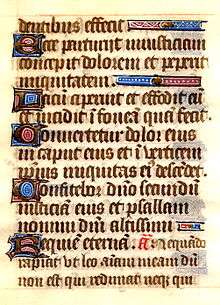Psalm 7
Psalm 7 is the 7th psalm from the Book of Psalms. Its authorship is traditionally assigned to King David. The Greek and Masoretic numberings are the same for this psalm. The message in the psalm is that the righteous may seem weak, but ultimately will prevail against the wicked.[1][2]

Structure
The 7th Psalm is a Psalm of David, and one of the Lamentations of an individual. A possible outline the psalm as follows: [3]
- Verse 2f: calling upon God for help
- Verse 4–6: protestation of innocence
- Verse 7–10: achieving desires of the Last Judgment over his enemies
- Verse 11f: comforting certainty to YHWH
- Verse 13–17: Comparison of the wicked enemy the world court
- Verse 18: Vows.
Superscription
- A shiggaion of David, which he sang to the Lord concerning Cush, a Benjamite.
This line is verse 1 in Hebrew texts.[4] The Hebrew word shiggayon, which appears in the superscription, is of unknown meaning.[5]
Uses
in literature
Jonathon Edwards used some of the imagery from Psalm 7 in his famous sermon 'Sinners in the hands of an angry God".
Psalm 7:12,13 was used in Sinners in the hands of an Angry God as
The bow of God's wrath is bent, and the arrow made ready on the string, and justice bends the arrow at your heart, and strains the bow, and it is nothing but the mere pleasure of God, and that of an angry God, without any promise or obligation at all, that keeps the arrow one moment from being made drunk with your blood.”
A takeoff on this imagery used by the book by Brian Zahnd is "Sinners in the hands of a loving God" [6]
The arrow imagery will occur 15 times in Psalms, of God, of His enemies and even of children of blessed people.[7]
Catholicism
Around 530, St. Benedict of Nursia choose this psalm for the Tuesday office of Prime. According to the rule of St. Benedict, it was the first of three psalms.[10] This tradition is still respected in a number of monasteries.
In the Liturgy of the Hours, Psalm 7 is recited to the Office of midday on Monday the first week.[11]
References
- The Artscroll Tehillim, p. 10.
- Janowski, Bernd (1999), "JHWH der Richter – ein rettender Gott. Psalm 7 und das Motiv des Gottesgerichts", Die rettende Gerechtigkeit. Beiträge zur Theologie des Alten Testaments (in German), 2, Neukirchen-Vluyn, pp. 92–124.
- Gunkel, Hermann (1986), Die Psalmen [The Psalms] (in German), p. 24.
- New King James Version, footnote a
- Davidson, Robert (1998). The vitality of worship: a commentary on the book of Psalms. W.B. Eerdmans. p. 33. ISBN 978-0-8028-4246-6.
- Sinners in the Hands of a Loving God: The Scandalous Truth of the Very Good News, Brian Zahnd, 2017
- https://www.biblegateway.com/quicksearch/?search=arrow&version=NIV&searchtype=all&spanbegin=23&spanend=23
- The Artscroll Tehillim page 329
- See also Séfer Tehilim, de Rachi, XIe siècle.
- tradiction de Prosper Guéranger, Règle de saint Benoît, (Abbaye Saint-Pierre de Solesmes, réimpression 2007)p46.
- The main cycle of liturgical prayers takes place over four weeks.
External links
| Wikimedia Commons has media related to Psalm 7. |